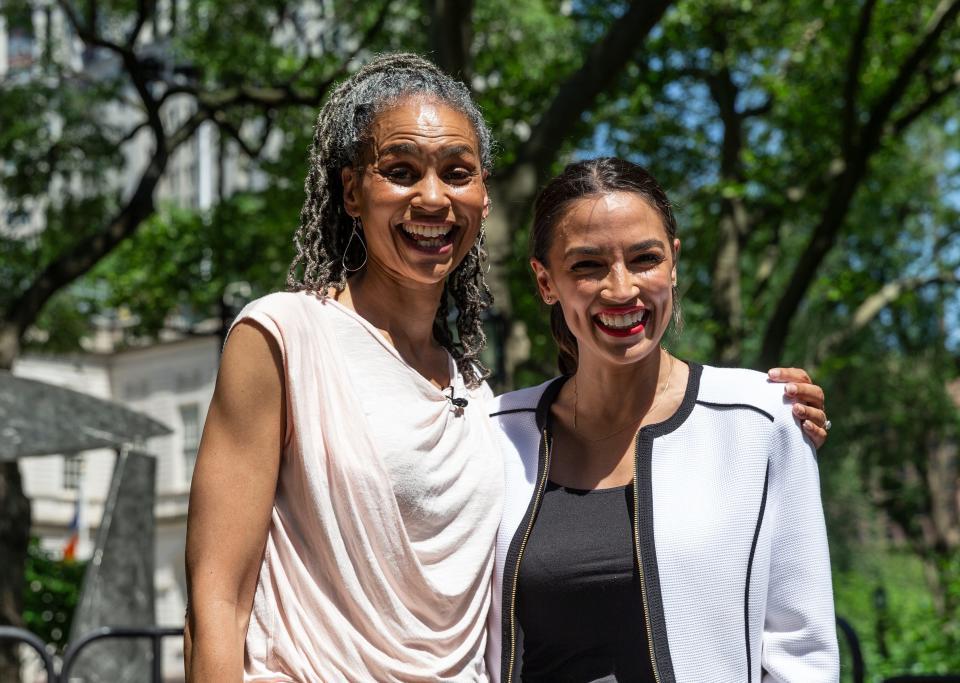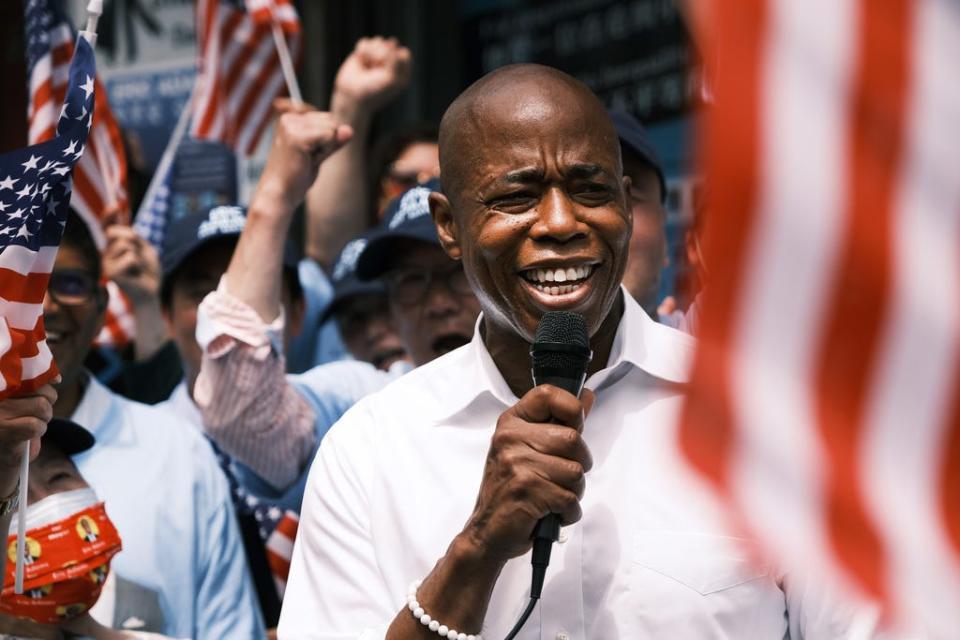New York City's mayoral race is all about police, crime. Will Ocasio-Cortez endorsement give progressives a boost?
NEW YORK – Amid a mayoral race in which moderate candidates focusing on public safety have led in polling, factions further to the left in New York City are coalescing around Maya Wiley less than two weeks before election day.
Wiley received her highest profile endorsement over the weekend from Rep. Alexandria Ocasio-Cortez, D-N.Y., a stalwart of self-described "progressive" politics.
Ocasio-Cortez called Wiley her "No. 1" choice for mayor in a primary election June 22, when voters will rank their top five candidates. The left-leaning Working Families Party backed Wiley as its first-choice candidate last week after supporting other candidates.
"We have an option of a candidate who can center people, racial justice, economic justice and climate justice, that didn't just come up to run for mayor but has experience and has a lifetime of dedication to this. And that candidate is Maya Wiley," Ocasio-Cortez said outside City Hall on Saturday.
Wiley is a lawyer, professor, former MSNBC commentator and member of Mayor Bill de Blasio's administration who entered the race in October.
Before the endorsement, Wiley hadn't cracked the top tier in most polling, and candidates who have called for increases in policing have fared much better throughout the race despite New York's reputation from outside observers as a liberal city.
What to know about the NYC mayoral race: The candidates, issues and why a 'progressive' isn't leading the way
The first major poll conducted after Ocasio-Cortez's backing and released late Wednesday by PIX11, NewsNation and Emerson College saw Wiley jump up to second place, though she still lagged behind former NYPD officer Eric Adams.
The upsurge of support for Wiley could be pivotal as more voters tune in, said Michael Hendrix, director of state and local policy at the Manhattan Institute.
"If there's a time to break out in the progressive lane, this is it," Hendrix said. "It's a big moment for her."
How Wiley won Ocasio-Cortez's, other liberals' backing
Before Democratic Mayor de Blasio, New York City elected Republican Rudy Giuliani to two terms and Republican-turned-independent Michael Bloomberg to three.
In the national spotlight, New York is sometimes cast as a city with extremely liberal politicians. It was even labeled an "anarchist jurisdiction" by the Department of Justice under President Donald Trump in a threat to withhold federal funding.
Eric Adams: New York City mayoral candidate takes heat from report he may live in New Jersey
In recent years, left-leaning candidates have made huge strides, and there was a perception among progressives that this race was their moment, Hendrix said.
De Blasio, though viewed unfavorably by many liberals, ran his mayoral campaign on the "tale of two cities," highlighting economic inequality and winning in 2013 and 2017. Ocasio-Cortez stunned national political observers when she defeated longtime incumbent Joe Crowley in 2018.
When Wiley announced her candidacy, she called for building a "stronger, fairer and more just city."
"Some will say I don’t sound like past mayors or look like them or think like them. And I say, 'Yes, I don’t. That is the point.' I am not a conventional candidate," Wiley said in a video.
Wiley has campaigned on a variety of liberal policy proposals, including expanding public housing investment; funding a "care income" to send $5,000 to low-income families for child and elder care; and creating a "Works Progress Administration-style infrastructure, stimulus and jobs program" that would cost $10 billion.
Wiley's platform also calls for "transforming" policing. She's backed measures that would cut at least $1 billion from the New York Police Department's budget and divert police funding to mental health and homelessness services, as well as schools.
"She's someone whose background as a community organizer, lawyer, someone who's taught social justice at the New School in Manhattan, and who also is a woman of color … lend credence to support by progressives," Hendrix said.

Wiley has won the backing of other left-leaning politicians in New York and beyond, such as Rep. Jamaal Bowman, D-N.Y.; Sen. Elizabeth Warren, D-Mass.; former Housing and Urban Development Secretary Julián Castro; the city's public advocate Jumaane Williams; and state Sen. Julia Salazar.
Dianne Morales and Scott Stringer, two other liberal candidates, have experienced campaign setbacks.
Stringer, the city's comptroller who has run on a balance of extensive government experience and liberal policies, was accused of sexual misconduct by two women, including a former campaign staffer, The New York Times reported. The former staffer accused him of unwanted kissing and groping. Stringer denied the allegation.
Morales, a former executive at a nonprofit group, faced internal division in her campaign after her staff formed a union and made a list of demands that Morales rejected. City & State, a local news outlet, reported Morales said the demands "included things that either violate state and local laws, and/or create a risk of fiscal liability for the campaign."
Whether the endorsements for Wiley will reshape the race remains unclear.
While progressive support has appeared divided between the three candidates before the Wiley endorsements, winning in New York City requires a coalition of diverse voting blocs, said Ester Fuchs, director of the Urban and Social Policy Program at Columbia University.
"I don't think an individual politician's endorsement brings a significant bloc of voters," said Fuchs, who worked in Bloomberg's administration and donated to Stringer's campaign.
Why more moderate candidates lead in most polls in NYC's 'post-COVID moment'
In the mayoral race, seen by many as one of the most consequential in recent history, as the city comes out of the COVID-19 pandemic, polling has not shown consensus support for a far-left mayoral candidate.
Adams leads the crowded pack of eight major Democratic candidates, according to a poll from NY1/Ipsos, released Monday and conducted from May 17 to 31. Close behind were Andrew Yang, a former Democratic presidential candidate, and Kathryn Garcia, a former head of the city's sanitation department.
Though there is a Republican primary between businessman Fernando Mateo and Guardian Angels founder and radio host Curtis Sliwa, neither is likely to present a competitive challenge to the winner of the Democratic primary.
Adams, Yang and Garcia run much more moderate campaigns than Wiley on the issue of policing.
Yang and Garcia called for more officers in certain areas, and Adams, who is the Brooklyn Borough president and was briefly registered as a Republican in the 1990s, has made public safety the central message of his campaign. Hendrix said Adams appealed to Black voters who support "community policing" while calling for reforms to the department.
After Ocasio-Cortez backed Wiley, Adams accused his opponent of trying to cut the police budget and decrease the size of the department "when Black and brown babies are being shot in our streets, hate crimes are terrorizing Asian and Jewish communities, and innocent New Yorkers are being stabbed and shot on their way to work."

Shooting incidents have increased 77% this year versus 2020, according to NYPD statistics; however, shootings remain at far lower levels than in the peaks of violent crime in New York City in the 1980s and 1990s and are closer to levels in the mid-2000s.
According to the NY1/Ipsos poll, 72% of voters say they support the NYPD putting more officers on the street.
On the other side of the public safety debate, the issue of policing reform has gained support in the wake of the killing of George Floyd, Fuchs said, and Adams, Yang and Garcia all vow to address those concerns, too.
The moderates and "old school liberals" in the race, Fuchs said, have balanced those two demands: "They want the police department reformed, but most people want the crime rate down, and they believe that police are a part of that."
Further drawing support away from the left may be the shadow de Blasio, Hendrix said. Though de Blasio enacted a policy of citywide pre-K during his term as mayor, he has largely fallen out of favor along the Democratic political spectrum.
When the candidates were asked at a debate last week whether they wanted de Blasio's endorsement, only Yang raised his hand.
Though the election of Ocasio-Cortez was surprising nationally, Fuchs said, it wasn't as shocking in hindsight locally, considering the changing demographics of her district, the voters her campaign mobilized and Crowley's lack of a competitive challenger before Ocasio-Cortez.
Fuchs and Hendrix said other issues around quality of life have come to the forefront as the city recovers from the effects of the COVID-19 pandemic.
"It's a post-COVID moment when the policy solutions of moderate Democrats seem to resonate more with voters," Hendrix said.
Follow USA TODAY's Ryan Miller on Twitter @RyanW_Miller
This article originally appeared on USA TODAY: NYC mayor race: Wiley gets AOC backing; why progressives not leading

 money
money 